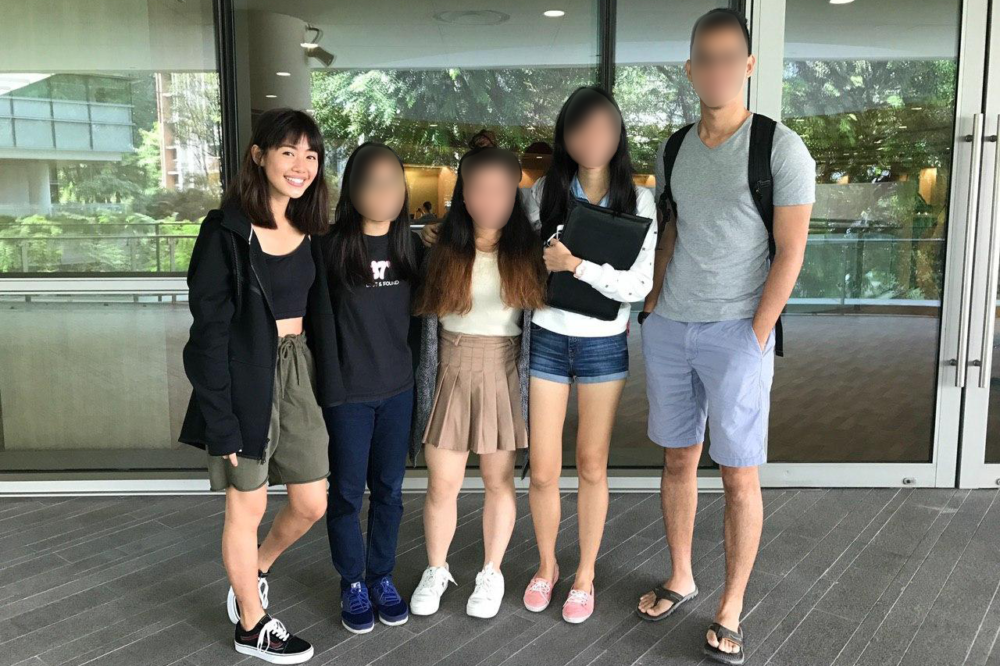Uni Life In Singapore
As a prospective university student myself, I’ve come to realise there isn’t much insider information online about what uni life in Singapore is really like.
I decided to ask undergrads and fresh grads from Singapore to spill the tea on admissions, school life and working with others. If you’re reading this, chances are that you’re a prospective uni student yourself. Hopefully, their answers will help you make more informed decisions when it comes to your university choices.
Admissions
Any tips on acing university interviews?
 Samantha (second from left) studied Communication Studies at NTU
Samantha (second from left) studied Communication Studies at NTU
“Be woke. Don’t just limit your research to the university and the course. Have a solid career plan too, because they may inquire about your post-university plans, such as the company you aspire to secure a long-term career at, and how you plan to progress up the corporate ladder. Obviously, when answering such questions, you’ll have to [say] how pursuing a course at their university will help you reach that goal. That will allow the panel to see how hungry you are for the spot.”
Freda, Nanyang Technological University (NTU) Communication Studies graduate
“Know why you want to pursue what you want to pursue. Be sincere and ask questions to clarify. That shows you’re interested and engaged. Also, do lots of research and be familiar with not just the course, but the faculty and university too—[it’s] almost like a job interview.”
Gladys, National University of Singapore (NUS) Communications and New Media graduate
Academics & curriculum
What is the curriculum like? Is there an even balance between exams and practical work?
 Leah studied Business Administration at NUS, Source
Leah studied Business Administration at NUS, Source
“SMU follows the American curriculum, so we don’t have separate lectures or tutorials. Instead, we have seminars that are three hours long. Class participation accounts for 15-20% of your grade. As SMU is a business school, Social Science undergraduates don’t get that much exposure to practical work, but there’s a ton of exposure to presenting yourself as a businessman or businesswoman.”
Ariella, Singapore Management University (SMU) Psychology graduate
“I was a communications major so the focus was more on practical work than written examinations. But while school projects are useful in providing a platform to apply what you’ve learnt, it is necessary to gain real-world experiences through internships and relevant part-time jobs. I learnt so much more at work than I did in school.”
Freda, NTU Communication Studies graduate
“Much of what we learn in Communications and New Media (CNM) is theory-based and you only really get practical experience during the compulsory internship programme. Otherwise, it’s really mostly just memory work.”
Elizabeth, NUS Communications and New Media graduate
“My one-year programme had only presentations and essays.”
Amirah, Nanyang Academy of Fine Arts (NAFA) Arts Management graduate
“SIT adopts a block module teaching system, which means we study and sit for an exam after every module is taught. In other words, we sit for exams every 3 to 4 weeks. While this definitely helps us break the curriculum into palatable chunks and ensures we truly comprehend it every step of the way, it can get really intense.”
Calista, Singapore Institute of Technology (SIT) Chemical Engineering undergraduate
How do/did you maintain a healthy mind and body while coping with intense schoolwork?
 Samantha (bottom) studied Communication Studies at NTU
Samantha (bottom) studied Communication Studies at NTU
“Join CCA and hall activities! I was in different clubs and societies for different years because I wanted to meet various like-minded individuals.”
Li Ying, NTU Chinese Studies graduate
“I danced a lot out of school and in school productions. I spent my remaining free time either with my hall friends or working as a part-time fashion stylist at a retail boutique, [fashion is] my other passion.”
Leah, NUS Business Administration graduate
“Finding a go-to spot where I know I focus best and studying there helps me stay calm when mugging. A crowded place with noisy students makes me stressed and angsty.”
Hannah, Singapore Institute of Management (SIM) Sociology undergraduate
“Keeping fit and having a healthy sleep pattern is crucial in maintaining hormonal balance, which influences your state of mind. That in turn affects your mood, productivity and performance. Basically just exercise regularly and try to sleep by 11pm. But of course, that’s easier said than done.”
Wong, SIT Game Design graduate
How’s group work like in university? Can you share your best and worst experiences working in a team?
 Clara (first from left) studied Communications and New Media at NUS
Clara (first from left) studied Communications and New Media at NUS
“I had a great experience working with my FYP (Final Year Project) teammates. We all naturally assumed different roles based on our strengths, and managed to stay friends after despite many FYP horror stories from other groups. It worked because we never slacked off and were able to separate work from friendship.
On the other hand, I had a horrible time working in this 4-man team for a video production module. We had to produce and shoot 3 videos, and while it was already challenging with only 4 of us, one of my teammates chose not to contribute anything. Our videos ended up performing so poorly.”
Samantha, NTU Communication Studies graduate
“It’s only been a couple of months, so I don’t have much experience working in a group. But I can already tell that the difference in the working styles of poly and JC students is pretty evident.”
Hannah, SIM Sociology undergraduate
“It’s always great when you have team members sharing similar work ethics as you. However, having a university exchange student in your team is truly the scariest—it can potentially make or break your grades. Coming from a totally different country with differing values and cultures, he or she might have novel ideas to contribute. But because they’re merely being graded as pass or fail, they may only contribute the bare minimum or less. It [can be] impossible to work with them!”
Clara, NUS Communications and New Media graduate
Pursuing Studies In A University In Singapore
Everyone walks their own path in university and your experience might differ greatly than those reflected above. Matters regarding academics and curriculum may vary depending on the nature of the course and its modules, and can often vary among unis too. Write in to hello@zula.sg if you have an interesting story to share!
Cover image: Source, Source, Source








